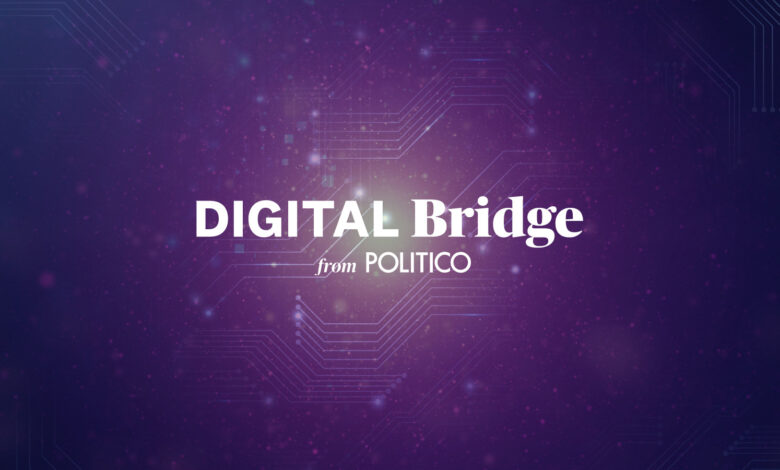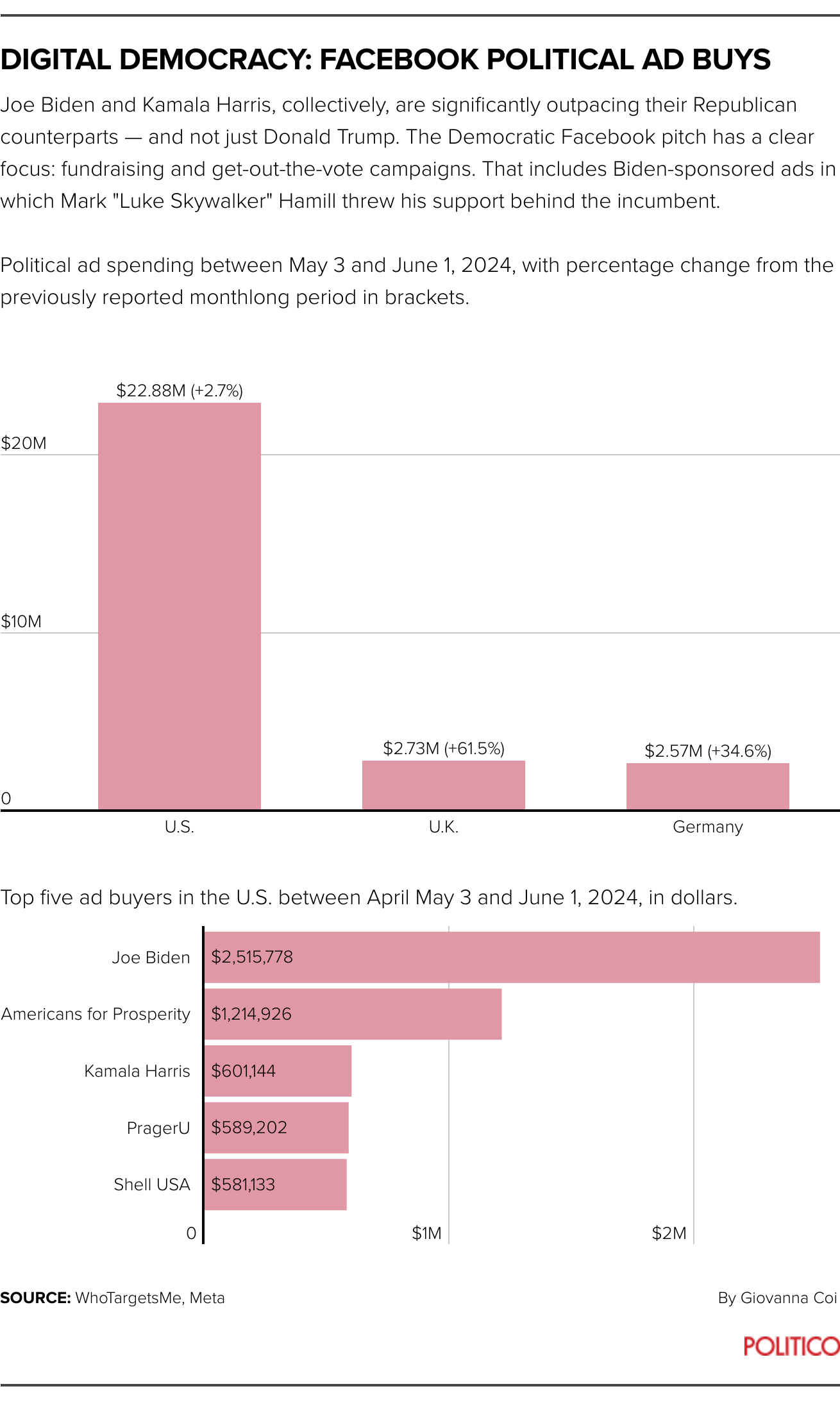When generative AI gets political – POLITICO

By MARK SCOTT
Send tips here | Subscribe for free | View in your browser
WELCOME BACK TO ANOTHER DIGITAL BRIDGE. I’m Mark Scott, POLITICO’s chief technology correspondent, and will be on a panel in a few hours (4 p.m. CET / 10 a.m. ET) to discuss artificial intelligence and the European election. If that’s your jam, sign up here.
Comfortable? Let’s get started:
— American political campaigns are experimenting with so-called generative artificial intelligence. So far, it’s been hit-or-miss.
— Leaders from the G7 countries gather for their annual summit next week. Here’s all you need to know about how tech and digital will be discussed. Hint: It’s not a priority.
— The United Kingdom’s national election is a month away, so I created an online tracker of political narratives on Meta’s platforms to keep you up to speed.
POLITICOS + GEN AI = MIXED RESULTS
THERE ARE STILL FIVE MONTHS TO GO before the United States votes on Nov. 5. But in the public’s imagination, we’re already living in a world of mass AI-created deepfakes on social media, “Minority Report”-style automated systems of political targeting, and the complex marrying of next-generation artificial intelligence tools and old-school political campaigning. The reality, however, is a lot less sexy. A group of researchers, led by those at the University of Texas, interviewed more than 20 political operatives, on both sides of the blue-red political divide, about how they used generative AI in this year’s campaign. What they found was a melting pot of experimentation, both at the local and national levels, on how to best use the technology to gain an advantage. But, so far, no specific killer use case had yet bubbled to the surface. “It’s just starting now,” Zelly Martin, a researcher at the University of Texas at Austin’s Center for Media Engagement and co-author of the paper, told me. “It will only get crazier, day by day.”
From the interviews, conducted in the first four months of 2024, specific early-stage patterns stood out. That included a relative reluctance, especially from national campaigns, to rely too heavily, if at all, on generative AI tools like ChatGPT. Part of that is down to reputational risk: No one wants to get caught appealing for donations via a chatbot or using AI-created direct-mail campaigns. A public focus on the alleged proliferation of deepfake videos, audio clips and images — even if that’s not really what’s happening — had turned some seasoned political campaigners away from wading into the generative AI craze. “The professional campaigning will be a slower adopter” than other industries, conceded Dean Jackson, another co-author of the research and head of advisory firm Public Circle Research & Consulting. “The U.S. is lagging [behind] places like Southeast Asia” in the use of generative AI tools in political campaigning.
Where we’re already seeing the technology rolled out, though, is in local elections. New York City Mayor Eric Adams used generative AI tools to make robocalls in multiple languages. Another New York politician, council member Susan Zhuang, relied on the technology to answer a reporter’s questions. In part, that’s down to less scrutiny of such tactics compared with the national stage. But those interviewed for the research also stressed that AI allowed less well-funded campaigns to access tools and strategies that had once been off-limits because of budgetary constraints. “There’s something of an arms race mentality in this space,” said Samuel Woolley, another co-author and assistant professor at the University of Texas. “Yes, the testing is happening at a local level. But there’s also the hype that occurs in the [generative] AI space that affects everyone, so that everyone says, ‘Well, they’re doing it. So we should do it.’”
Where generative AI really has an effect, based on politicos working for campaigns, is the non-sexy parts of electioneering. Both Republican and Democratic operatives said they had used the technology to better segment audiences on social media; to fast-track analysis based on large data sets; and to conduct opposition research. That’s a long way away from the snazziness of AI deepfakes flooding social media, but — in truth — it’s where the technology can already have meaningful benefits by speeding up the grunt work of campaigning. “The majority of [use-cases are] going to be people using it for very fast data analysis,” Martin added. “People using it so they can free the humans on their team to do the more high-level creative thinking.”
That may not sound super exciting, but the nitty-gritty of political campaigns is just that. Jackson, one of the co-authors, said an interviewee had said generative AI had allowed him to onboard new recruits faster by removing the need to teach them Excel shortcuts (hooray!). Woolley, the other co-author, said such efficiencies should not be underestimated. “We talk a lot about the sensational uses of AI,” he told me. “But there are some big questions, surfaced in this report, about the extent to which there are guardrails that manage the sorts of under-the-hood data analysis and more mundane uses of this technology.”
And that brings us to the murkier side of the campaigning world. Those interviewed — and, to be clear, they were all U.S.-based political operatives — said there weren’t any rules that stopped them from using generative AI to, say, undermine opponents or suppress voter turnout. “They all noted that we’re just building the plane as we’re flying it,” Martin added. “We have no guardrails. We have no restrictions other than the ones that we put in place.” Republicans also demonstrated a greater aversion to regulation over AI’s use in campaigning compared with their Democratic counterparts. But, Jackson said, that may have more to do with the intricacies of a diverse pool of tech vendors selling to Republicans versus a more centralized pool of companies targeting Democratic campaigns. “When Republicans do adopt the tech, there might be sort of fewer norms within the party to govern how it’s used,” he added.
So, given that the use of generative AI in this year’s U.S. election cycle was still in its infancy, where did the researchers believe potential threats could come from in the months to come? All three focused on local races — including presidential campaigns in key swing states like Pennsylvania, Michigan and Arizona — where more underhanded AI tactics, including deepfakes, may still take off. They also raised concerns about how minority communities, including those who spoke Spanish or Arabic, could be targeted with AI-generated voter-suppression efforts between now and November. “Targeting marginalized communities will continue. Whether generative AI is used in that or not, I’m not sure yet,” said Martin. “But it is something that I’m concerned about.”
CIAO, G7! PARLIAMO DEL DIGITALE?
WHEN WORLD LEADERS AND OFFICIALS DESCEND on Fasano, a small town in the boot of Italy, for the annual G7 Summit on June 13-15, there’ll be a lot to discuss — and most of it won’t be about digital. Expect the ongoing wars in Ukraine and Gaza, respectively, energy security issues and greater support for African countries to take center stage, based on discussions with four officials working on the upcoming event. Tech — and, most notably, artificial intelligence — will play a role. But don’t expect fireworks or glitzy announcements. (Caveat: The agenda has yet to be finalized, so there’s still scope for last-minute changes.) But here’s what you need to know about what’s coming on tech and digital during next week’s summit.
Like seemingly all set-piece global events these days, the Italians, who hold the rotating G7 presidency, have set aside time for discussions on AI. They even invited Pope Francis, who’s been peddling the Vatican’s own ethical framework around the emerging technology since it was written in 2020. The likes of Microsoft and IBM were quick to sign up to those nonbinding commitments around ethics, human rights and transparency. Expect the pope to again urge others to follow suit, even if his so-called Rome Call for AI Ethics mostly replicates existing pledges via the Organization for Economic Cooperation and Development and UNESCO.
Italy’s Prime Minister Giorgia Meloni has focused on AI’s effects on the labor market. She’s particularly eager to ensure small businesses don’t get wiped out by the technology, as well as find ways for traditional firms to jump onto the AI bandwagon. There was a particular emphasis on that during the recent G7 digital ministers meeting in March. Also expected: further work on the so-called Hiroshima Process, a nonbinding effort to safeguard the use of generative AI. The Italian G7 presidency has been tasked with turning that language, agreed during Japan’s G7 presidency in 2023, into a reality. It’s not always smooth sailing. An official from outside monitoring group, for instance, told me that when he tried to flag potential harm outlined in the G7 commitments, he was turned away by multiple governments that said it wasn’t their responsibility. Good times.
That won’t stop G7 leaders — many of whom are eager or desperate to show their voters that they have the emerging technology under control — from going hard on AI. Sure, it won’t be at the same level as commitments to combat Russian aggression in Ukraine and efforts to quell the ongoing war in Gaza. But expect the British government to herald the so-called Seoul Declaration, recent pledges around AI safety and inclusion. Expect the European Commission to champion the bloc’s Artificial Intelligence Act. Expect the U.S. delegation to promote the White House Executive Order on AI, including its upcoming national security memorandum — focused, not surprisingly on the technology’s national security implications — that could be announced as soon as this week.
Two other AI items are also on the docket, though I’ve yet to get a full readout on what to expect. The first is an Italian-led push to support African countries in the development and implementation of homegrown AI ecosystems and regulatory approaches. In April, Rome teamed up the African Union, United Nations and local governments to promote an “AI Hub for Sustainable Development” to, well, use the technology to meet U.N.-mandated development goals. The fact that leaders from Kenya, Egypt and Tunisia have been invited to next week’s event signals that a reaffirmation of those commitments is likely.
The other AI-linked effort is again promoted by Italy and centers on championing investment and innovation linked to artificial intelligence. In a world where tens of billions of dollars are being spent, annually, on the technology, that may seem like a no-brainer. But Meloni has already announced plans for $1 billion in public funding — on top of which she’s hoping to raise a further $2 billion in private capital. That sounds like a lot, but when OpenAI has raised, alone, six times that figure, Italy’s innovation-first funding strategy starts to look a little meager.
Alongside the AI-fixation, I would expect to see the longstanding commitments around free flows of data; pushback against authoritarian regimes’ foreign interference efforts; and language about promoting a free, fair and democratic worldview across the digital realm. At this point, though, such statements feel a little empty. It’s not exactly controversial to say democratic governments support democratic values. But how to make that happen globally — via billions of dollars for digital infrastructure investments across the Global South, a coordinated approach to digital policymaking (if not, regulation), and a recognition that not everyone has the policymaking capacity of Brussels and Washington — is still lacking, especially when it comes to engagement with non-G7 countries.
BY THE NUMBERS
|
caption | credit |
THE CASE FOR TRANSPARENCY: UK EDITION
AS SOMEONE WHO’S COVERED EVERY WESTERN ELECTION AND REFERENDUM since 2016 (lucky me), I’ve always relied on CrowdTangle, Meta’s social media analytics tool, to track the online side of campaigns. The tech giant is about to shut down that service in August — much to the dismay of independent researchers. After the European Commission complained, Meta at the last minute created CrowdTangle overviews for each European Union member country ahead of this week’s European Parliament election. Those provide a granular breakdown of what’s happening on Facebook and Instagram, respectively.
What the company didn’t do, however, was do the same for the U.K., whose national election will be held on July 4. Luckily, I’m one of the few who still has access to CrowdTangle, so I did what Meta should have done and built one myself. Data includes Facebook and Instagram accounts from all the major political parties, politicians and local media. It’s divided into columns for ease of use. It’s free to use, so please share widely.
What’s interesting, based on CrowdTangle’s data, is how much Nigel Farage and his right-wing Reform UK party have dominated the online conversation compared with more mainstream parties. That’s partly due to Farage’s large social media presence and the media’s obsession with using him to spice up a pretty staid election. Will that equate to a meaningful shift in voter attitudes? My guess is probably not. But the CrowdTangle display again shows why such independent transparency of what happens online during an election is vital. And, to be clear, it’s about to disappear.
**Election week is here! Cure your EU election hangover with POLITICO Live on Monday morning and tune in online with Secretary Generals Thanasis Bakolas (EPP), Giacomo Filibeck (PES) and Didrik de Schaetzen (ALDE). Time to register!**
WONK OF THE WEEK
In light of the upcoming G7 Summit in Italy, we’re looking this week at Paolo Benanti — a.k.a. the Vatican’s AI mentor — who was the chief architect of the Pope’s “Rome Call for AI Ethics” (see above section).
The 50-year-old Italian priest teaches technological ethics, among other things, at the Vatican-backed Pontifical Gregorian University. Since 2018, his work has primarily focused on the impact of artificial intelligence.
“The biggest risk is that AI will make or be used to make decisions on people’s lives in a surreptitious, non-democratic way,” Benanti told my colleague, Gian Volpicelli. “That’s why we need a grassroots governance process steering innovation towards progress.”
THEY SAID WHAT, NOW?
“AI companies possess substantial non-public information about the capabilities and limitations of their systems, the adequacy of their protective measures, and the risk levels of different kinds of harm,” according to an open letter from current and former employees of companies like OpenAI and Google. “However, they currently have only weak obligations to share some of this information with governments, and none with civil society. We do not think they can all be relied upon to share it voluntarily.”
WHAT I’M READING
— A network of bad actors peppered hundreds of fact-checking groups and researchers with coordinated efforts to waste their disinformation-busting resources. More here.
— Tech Policy Press put together an exhaustive breakdown of what has happened in the first 100 days of the EU’s new social media rulebook.
— Researchers pieced together how Russian disinformation was seeded across the internet via seemingly obscure websites that were used to promote pro-Kremlin messages across the U.S. and Europe. More here.
— António Guterres, the U.N. secretary-general, lays out his vision for what is needed to avoid “sleepwalking into a dystopian AI future.” More here.
— Academics at George Mason University simulated a war game between China and two U.S.-based teams: one made up of humans, the other of ChatGPT. Overall, the AI was more defensively minded than its human counterparts. More here.
— The Atlantic Council provides an overview of proposals in `Brazil to regulate forms of artificial intelligence ahead of the country’s local elections in October. Take a look.
**What happens in Brussels doesn’t have to stay in Brussels ─ lesen Sie, wie Europa das politische Berlin bewegt. Melden Sie sich jetzt an und erhalten Sie für zwei Wochen eine kostenlose Testversion von Brussels Decoded – Das Europa Briefing.**
SUBSCRIBE to the POLITICO newsletter family: Brussels Playbook | London Playbook | London Playbook PM | Playbook Paris | EU Election Playbook | Berlin Playbook | Global Playbook | POLITICO Confidential | Sunday Crunch | EU Influence | London Influence | Digital Bridge | China Watcher | Berlin Bulletin | D.C. Playbook | D.C. Influence | All our POLITICO Pro policy morning newsletters




